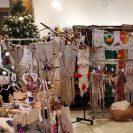Stepping out of the mid-day heat and into the too-cold shop, he immediately, without even bothering to look up, says, “Sit here,” as if he’s been expecting me and I’m late and now we will have to hurry.
It looked nothing like a real barber’s chair—nothing leathery to speak of, no shiny chrome armrests, nowhere to rest your feet– except that it was aimed in the right direction, at a big wall mirror. It was only then, as he tucked what truly looked to be somebody’s bed sheet neatly around my neck, that I saw he had one eye.
I had never ever thought about one-eyed barbers, not even in my dreams, but now here was one, with nothing more than a fleshy gap where there should have been an eyeball, as if someone had reached in with one of those harmless ice cream scoopers. Aside from his one-eyedness, everything else about him looked barber-normal: a dainty moustache, a clatter of yellow teeth, long tapered fingers, and so on. As he busied himself around me, I thought about his one-eyedness, and secretly, in some kind of odd geometrical way, wondered what it would mean to my haircut—longer on one side, shorter on the other? Meanwhile, he and his fellow-barber, who, by the way, had two good eyes, never broke stride with their conversation which sounded like Hindi, only angrier. While one would talk the other would grunt and after a while they’d change roles. That first day, I showed him how much I wanted cut off—nothing more than a trim–holding up a tiny ½ inch gap between thumb and forefinger to his one eye, and he squinted at it, considered, then said, “Okay.” I had heard that Okay before, in Saigon, when I did the same thing, “Take that much off.” Holding up the same ½ inch space, and she answered with the same Okay. In the end that was how much she left on my head.
In the world of back-street barbering, he was tolerable. Truth be told, he spent more time chatting with his fellow barber and glancing at the Indian soap opera on the overhead TV than he did cutting my hair—in mid-snip turning to see who was screeching and why. More than once I set my teeth, steeling myself for the pain of having my ear snipped, wounded, but magically, in some kind of one-eyed barber way, he managed to watch his soap opera, carry on a conversation with his fellow-barber and cut my hair. He did his duty and because his English was no better than my Arabic, our conversations were short, full of Neanderthal mumbling and gestures. In the end, my haircut looked fine and I gave him a little extra, three dinar, and he said what sounded like a normal thank you, as if paying him a little extra was only right, even expected.
Now I have two barbers—one away in Kabul, the other one-eyed—and both are fine as far as backstreet barbers go, but the one-eyed barber is the better, maybe because he takes more time, snipping here and there, although I can’t see what there is to snip. He even massages my forehead, my eyebrows, using his thumbs to make small sleepy circles on my temples, something Mohammed would never do.
Mohammad’s shop is easily missed, overlooked, mistaken for one of those gray vacant shops, its windows thick with dust and grime, and nothing like a hint of electricity. The once-sign in Arabic, saying, I can only imagine, this is a man’s hair shop, but it is hard to tell because the lettering has long since been peeled away. Only if you press your face against the murky glass, can you see a hint of something going on, and once you give the door a shove there he is, more times than not, stretched out on the green couch, the TV making the necessary Bollywood background noise, and he will jump up, saying, “Hi, brother.”
I call him Mohammed and he never once made any attempt to correct me, or maybe he did, but never mind because now he was away for Ramadan, back to Kabul for three weeks, in the meantime my hair couldn’t wait, and so I wandered the neighborhood backstreets and found the one-eyed barber who motioned for me to, “Sit here.” And yet I don’t want to ignore Mohammed completely, and when he returns I will go to him for one of his trims, just to make him happy.
When I go back to see my Mohammed, Ramadan all done, there is another, newer piece of paper taped to the window that says, “Employee in Hospital”. Which means I may have to return to my one-eyed barber. There is nothing wrong with that, come to think of it. One-eyed barbers, two-eyed barbers, except for the one only looking at my head half the time, what’s the difference?
Photo by Chris Knight on Unsplash.











